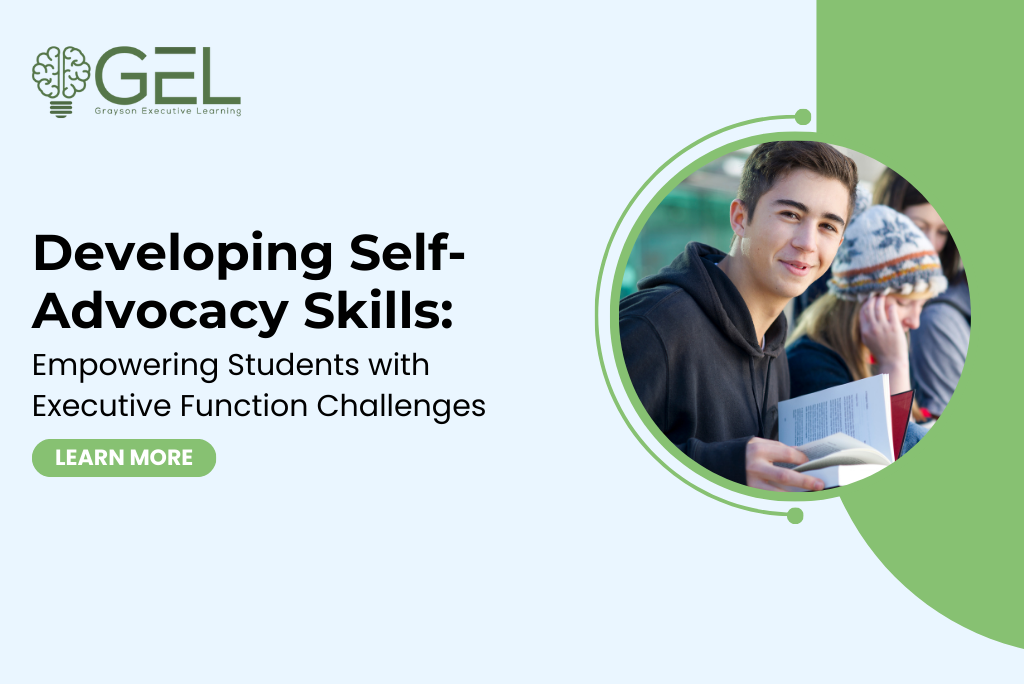At Grayson Executive Learning (GEL), we understand that building strong executive function skills is essential for students to thrive academically and personally. However, even with well-developed skills like time management, organization, and emotional regulation, many students still struggle to reach their full potential. The missing piece? Self-advocacy.
Self-advocacy empowers students to understand their needs, communicate effectively, and take initiative in their learning journey. It’s the bridge between possessing executive function skills and applying them confidently in real-world situations. Without self-advocacy, students may know what to do but hesitate to act, leading to missed opportunities and continued frustration.
What Is Self-Advocacy?
Self-advocacy is the ability to understand one’s needs and effectively communicate them to others. For students, this means recognizing when they need help, understanding their learning styles, and expressing their preferences and concerns. It’s about taking ownership of their education and being proactive in seeking support and resources.
Key components of self-advocacy include:
- Self-awareness: Understanding personal strengths, weaknesses, and learning styles.
- Communication skills: Expressing needs, preferences, and concerns clearly and respectfully.
- Confidence: Believing in one’s ability to succeed and make decisions.
- Responsibility: Taking initiative and being accountable for one’s learning.
The Role of Self-Advocacy in Executive Function
Executive function skills are the mental processes that enable us to plan, focus attention, remember instructions, and juggle multiple tasks successfully. These skills are crucial for academic success and daily life management. However, without self-advocacy, students may struggle to apply these skills effectively.
For example, a student may have excellent time management skills but may not communicate with a teacher about needing an extension due to unforeseen circumstances. Without self-advocacy, the student may miss deadlines and experience unnecessary stress, despite having the skills to manage their time.
Integrating self-advocacy with executive function skills ensures that students can:
- Seek clarification when they don’t understand instructions.
- Request accommodations that support their learning.
- Communicate effectively with teachers and peers.
- Take initiative in their learning and problem-solving.
Challenges Students Face Without Self-Advocacy
Students lacking self-advocacy skills often encounter several challenges:
- Avoidance of Help: Fear of appearing incompetent may prevent students from seeking assistance.
- Miscommunication: Inability to express needs can lead to misunderstandings with teachers and peers.
- Low Confidence: Without advocating for themselves, students may feel powerless and disengaged.
- Missed Opportunities: Failure to communicate can result in missed deadlines, lower grades, and limited participation in class activities.
These challenges can create a cycle of frustration and underachievement, even among students with strong executive function skills.
Building Self-Advocacy Skills: Strategies and Practices
Developing self-advocacy skills is a gradual process that involves intentional practice and support. Here are strategies to help students build these essential skills:
- Foster Self-Awareness: Encourage students to reflect on their learning styles, strengths, and areas for improvement. Journaling and self-assessment tools can aid in this process.
- Teach Communication Skills: Role-playing scenarios can help students practice expressing their needs and concerns. Teaching assertive communication techniques empowers students to speak up respectfully.
- Set Goals and Monitor Progress: Guide students in setting achievable goals and tracking their progress. This practice builds confidence and reinforces the value of taking initiative.
- Encourage Decision-Making: Provide opportunities for students to make choices in their learning, such as selecting project topics or choosing study methods. This fosters a sense of ownership and responsibility.
- Model Self-Advocacy: Demonstrate self-advocacy behaviors in your interactions with students. Share personal experiences where advocating for yourself led to positive outcomes.
- Create a Supportive Environment: Cultivate a classroom culture where questions and discussions are welcomed. Ensure students feel safe and respected when expressing their needs.
Case Study: Fred’s Transformation Through Coaching
Fred, an adult student at GEL, exemplifies the transformative power of integrating self-advocacy with executive function skills.
Background: Fred struggled with academic failure and low self-esteem, believing he wasn’t meant for school. His challenges included chronic procrastination, poor study skills, and avoidance behaviors.
Intervention: Through coaching, Fred developed structured routines, effective study habits, and, crucially, self-advocacy skills. He learned to communicate his needs, seek support, and take initiative in his learning.
Outcome: Fred became a standout student, earning A’s in his courses and gaining the confidence to pursue a fulfilling career. His ability to advocate for himself played a significant role in his academic and professional success.
The GEL Approach: Integrating Self-Advocacy in Coaching
At Grayson Executive Learning, we recognize that self-advocacy is integral to student success. Our coaching programs are designed to:
- Assess Individual Needs: We evaluate each student’s executive function skills and self-advocacy abilities to tailor our coaching approach.
- Develop Personalized Strategies: Coaches work with students to build self-awareness, communication skills, and confidence.
- Provide Ongoing Support: Regular check-ins and feedback help students refine their self-advocacy skills and apply them in various contexts.
- Collaborate with Stakeholders: We engage with parents, teachers, and support staff to create a cohesive support system for the student.
By embedding self-advocacy into our coaching model, we empower students to take control of their learning and achieve their goals.
Conclusion: Empowering Students for Lifelong Success
Self-advocacy is the key that unlocks the full potential of executive function skills. By understanding and communicating their needs, students can navigate academic challenges, build resilience, and foster independence.
At Grayson Executive Learning, we are committed to helping students develop both the skills and the confidence to advocate for themselves. Through personalized coaching and a supportive environment, we guide students on a path to academic achievement and personal growth.
Ready to empower your student with self-advocacy and executive function skills? Schedule a free consultation with us today and take the first step toward unlocking their full potential.
How Grayson Executive Learning Can Help
Grayson Executive Learning (GEL) is a boutique Academic and ADHD\Executive Function Coaching practice that specializes in providing premium one-on-one academic coaching services to high school and college students with ADHD and executive function difficulties.
Click here to learn how we can help your student truly reach their academic potential while developing critical life and independence skills.
We look forward to serving you!


